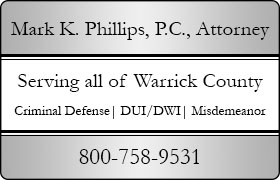Winslow Felony Lawyer, Indiana, page 7
Sponsored Law Firm
-
 x
x

Click For More Info:
-
Law Offices of Mark K. Phillips
114 South Third Street P.O. Box 427 Boonville, IN 47601» view mapDUI-DWI, Criminal Defense, Personal Injury Top Rated Indiana DUI Defense Lawyer
I offer passionate, loyal and fierce representation. I have over 20 years of experience to fight your Indiana DUI charge. I offer a free, initial consultation.
800-291-416 -
- Contact
- Free Consultation
- Visit:
- Website
- Profile
Not enough matches for Winslow Felony lawyer.
Below are all Winslow Criminal lawyers.
David M. Shaw
Power of Attorney, DUI-DWI, Bankruptcy, Bankruptcy & Debt
Status: In Good Standing *Status is reviewed annually. For latest information visit here Licensed: 52 Years
David Allen Bunner
Lawsuit & Dispute, Divorce & Family Law, Criminal, Bankruptcy & Debt
Status: In Good Standing *Status is reviewed annually. For latest information visit here Licensed: 47 Years
Dawnya G Taylor
Adoption, Child Support, Civil Rights, Criminal
Status: In Good Standing *Status is reviewed annually. For latest information visit here Licensed: 30 Years
Dean Allan Sobecki
Criminal
Status: In Good Standing *Status is reviewed annually. For latest information visit here Licensed: 40 Years
Dennis Lee Brinkmeyer
Lawsuit & Dispute, Estate, Criminal, Business
Status: In Good Standing *Status is reviewed annually. For latest information visit here Licensed: 50 Years
Douglas Shane Walton
Estate, Criminal, Civil Rights, Personal Injury
Status: In Good Standing *Status is reviewed annually. For latest information visit here Licensed: 25 Years
Emily Jean Trygstad Grothoff
Litigation, Criminal
Status: In Good Standing *Status is reviewed annually. For latest information visit here
Georgianne Marie Mastison
Other, Estate, Divorce & Family Law, Criminal
Status: In Good Standing *Status is reviewed annually. For latest information visit here Licensed: 18 Years
Glenn Alan Grampp
Lawsuit & Dispute, Family Law, Criminal, Accident & Injury
Status: In Good Standing *Status is reviewed annually. For latest information visit here Licensed: 52 Years
Hannah Belleau
Wills, Family Law, Criminal, Business & Trade
Status: In Good Standing *Status is reviewed annually. For latest information visit here Licensed: 10 Years
 Mark K. Phillips Boonville,Indiana
Mark K. Phillips Boonville,Indiana About UsMark K. Phillips
About UsMark K. Phillips Contact UsCall or Email Now
Contact UsCall or Email Now